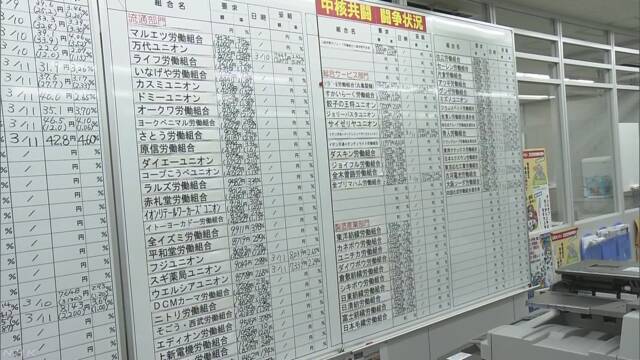Spring fighting Non-regular employment wage increase rate Successive employees are successively exceeding answers March 12 5:52
The spring fight on the 11th is the intensive response date on the 11th, and in the distribution and service industry where many non-regular employees are employed, the number of non-regular wage increases exceeds that of regular employees due to labor shortages.
UA Zensen, which is affiliated with unions in the distribution and service industries and textile and chemical industries, received a series of management responses on the evening of November 11, and the negotiations were concluded.
In addition to the shortage of labor, next month, the same level of pay for the same job for large companies will be paid for the same level of work. Answers were repeated one after another.
Among them, the drug store "Welcia" increased the hourly wage by ¥ 32 for the part-time workers who exceeded the regular employee wage increase, and the general supermarket "Ito-Yokado" also increased the hourly wage by ¥ 20.
In this spring fight, the spread of the new coronavirus has increased the uncertainty over the future of the global economy, and as a whole the brakes on wage hikes are expected to affect the negotiations of small and medium-sized businesses going into full swing in the future .
UA Zensen's Chairman Akihiko Matsuura said, “I think that the spread of the new coronavirus is a difficult situation for management, but the number of respondents, especially for non-regular employment wage increases, is higher than last year. I want to support the negotiations of small and medium-sized unions as we proceed. "
Brakes to increase wages
On the 11th of March, Spring Fighting, which is the day of concentrated response, the largest pitfall, the management of major companies such as automobiles and electric appliances responded simultaneously to the union.
In the automobile industry, Toyota and Mazda responded that they had zero bears for the first time in seven years, and total wage increases, including regular pay raises, were less than last year's conclusion.
In the iron and steel industry, three major companies, such as Nippon Steel, all responded, and for the next two years until the next fiscal year, they made a formidable answer, such as forgoing wage increases equivalent to bears.
On the other hand, in the restaurant business, Zensho Holdings, which operates Sukiya, etc., concluded with bears at a level higher than last year, and some wage increases were made.
However, as a whole, the spread of the new coronavirus has further increased uncertainty over the future of the economy, and whilst the management has been cautious about raising wages, the pace of wage increases has been dampened by the government's demands on the business community. It took a shape.
"Possibly negative impact on consumer spending"
Regarding the spring fight, Koichi Hideo Kumano, Economist, Chief Economist at the Dai-ichi Life Economic Research Institute, said, "When the spread of the new coronavirus infection comes to an end, it is hoped that the depressed consumption will recover. But this could have a negative effect on the momentum of consumer recovery. "

